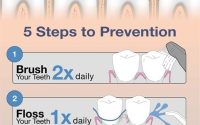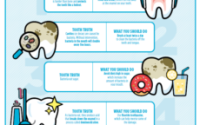How to Identify and Deal with Tooth Sensitivity
Introduction
Are you experiencing a sharp, sudden pain in your teeth when consuming hot or cold foods and beverages? If so, you may be dealing with tooth sensitivity. This common dental issue affects millions of people worldwide and can significantly impact your daily life. Understanding the causes, symptoms, and treatment options for tooth sensitivity is crucial in order to alleviate discomfort and maintain good oral health. In this blog post, we will explore how to identify tooth sensitivity and provide effective strategies for dealing with it.
Understanding Tooth Sensitivity
Tooth sensitivity is a common dental problem that causes discomfort or pain in the teeth when exposed to certain stimuli such as hot or cold temperatures, sweet or acidic foods, or even when brushing. It occurs when the protective layer of enamel on the teeth wears down, exposing the underlying dentin and nerve endings.
Identifying Tooth Sensitivity
Recognizing tooth sensitivity is crucial in order to address the issue effectively. Here are some signs and symptoms to look out for:
1. Sharp, sudden pain
If you experience a sharp, sudden pain in your teeth when consuming hot or cold foods or beverages, it could be a sign of tooth sensitivity.
2. Discomfort while brushing
If brushing your teeth causes discomfort or pain, especially around the gumline, it may indicate tooth sensitivity.
3. Sensitivity to sweet or acidic foods
Feeling a twinge of pain when consuming sweet or acidic foods like ice cream, citrus fruits, or soda can be a sign of tooth sensitivity.
4. Pain when breathing in cold air
If breathing in cold air causes tooth pain or sensitivity, it is likely that you have sensitive teeth.
Causes of Tooth Sensitivity
Understanding the causes of tooth sensitivity can help in preventing and managing the condition. Here are some common causes:
1. Brushing too hard
Aggressive brushing or using a hard-bristled toothbrush can wear down the enamel, leading to tooth sensitivity.
2. Gum recession
Receding gums expose the sensitive root surfaces of the teeth, making them more susceptible to sensitivity.
3. Tooth decay or cavities
Decayed teeth or cavities can cause tooth sensitivity, especially when the decay reaches the inner layers of the tooth.
4. Teeth grinding
Grinding or clenching your teeth can wear down the enamel and expose the dentin, leading to sensitivity.
Summary
Tooth sensitivity is a common dental problem characterized by a sharp, sudden pain in the teeth when exposed to hot or cold stimuli. It occurs when the protective layer of enamel on the teeth wears down, exposing the underlying dentin and nerve endings. The most common causes of tooth sensitivity include tooth decay, gum recession, enamel erosion, and teeth grinding. Identifying tooth sensitivity involves recognizing the symptoms such as pain or discomfort while consuming hot, cold, sweet, or acidic foods and drinks. If you suspect tooth sensitivity, it is important to visit a dentist for a proper diagnosis and to rule out any underlying dental issues.

Dealing with tooth sensitivity requires adopting certain oral care practices and making lifestyle changes. Using a toothpaste specifically designed for sensitive teeth can help alleviate symptoms. Additionally, using a soft-bristled toothbrush and practicing proper brushing techniques can prevent further enamel erosion. Avoiding acidic and sugary foods, as well as limiting consumption of hot and cold beverages, can also help manage tooth sensitivity. In some cases, dental treatments such as fluoride application, dental bonding, or a dental crown may be recommended by your dentist to provide long-term relief.
In conclusion, tooth sensitivity is a common dental problem that can cause significant discomfort. By understanding the causes, symptoms, and treatment options, you can effectively manage tooth sensitivity and maintain good oral health. If you are experiencing tooth sensitivity, it is important to consult with a dental professional for a proper diagnosis and pers important link onalized treatment plan. Remember, taking care of your teeth and addressing dental issues promptly is essential for a healthy and pain-free smile.
- Q: What causes tooth sensitivity?
A: Tooth sensitivity can be caused by various factors such as tooth decay, gum recession, enamel erosion, teeth grinding, and dental procedures. - Q: How can I identify tooth sensitivity?
A: Common signs of tooth sensitivity include a sharp pain or discomfort when consuming hot, cold, sweet, or acidic foods and drinks, as well as during brushing or flossing. - Q: What should I do if I have tooth sensitivity?
A: If you have tooth sensitivity, it is important to visit a dentist for a proper diagnosis. They can recommend suitable treatments such as desensitizing toothpaste, fluoride treatments, dental sealants, or dental procedures like fillings or root canals. - Q: How can I prevent tooth sensitivity?
A: To prevent tooth sensitivity, maintain good oral hygiene practices including regular brushing with a soft-bristled toothbrush, using fluoride toothpaste, avoiding excessive teeth grinding, and limiting consumption of acidic foods and drinks. - Q: Can tooth sensitivity be a sign of a more serious dental problem?
A: Yes, tooth sensitivity can sometimes indicate an underlying dental issue such as tooth decay, gum disease, or a cracked tooth. It is important to consult a dentist to rule out any potential problems.

Welcome to my website! My name is Spencer Rossi, and I am a dedicated and passionate dental assistant with extensive experience in general dentistry, braces, aligners, cosmetic dentistry, and pediatric dentistry. I am thrilled to have the opportunity to share my knowledge and expertise with you through this platform.



